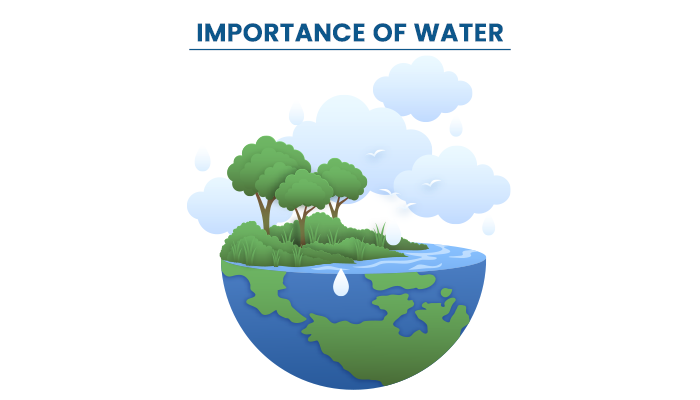
Importance of Water
Nov 02, 2022, 16:45 IST
Water is one of the most essential resources on the planet . Life cannot exist without water. But why is water so important? Water has several unique properties that make it a precious resource. Some such properties of water are mentioned below.
- Water is a good solvent – it can dissolve many substances.
- Water's boiling point and freezing point make it readily available in all three states (solid, liquid, and gas).
- The specific heat of a water is very high. This allows water to absorb and release heat, thereby regulating the temperature of its environment.
- Because of its transparency, water can allow light to penetrate life forms submerged in it. This is essential for the survival of plant life in oceans, lakes, and rivers.
- The water is neither acidic nor alkaline. Water has a pH of 7, making it a neutral substance.
These unique properties of a water, along with its abundance on the planet (approximately 71% of surface of the earth is water), make it a vital resource for plants, animals, and humans.

| Table of Content |
Importance of Water in Living Organisms
- Water is the medium through which all necessary vitamins and the minerals are transported in the bodies of all living organisms (due to its ability to dissolve a wide range of the substances).
- Water also plays an important role in facilitating the work of enzymes in living organisms. For example, sodium bicarbonate is secreted by the pancreas and is broken down into ions by the water, making the medium alkaline enough for the enzymes to function.
- Water helps maintain the body temperature of plants and animals. To lower their body temperature, animals lose water through sweating (perspiration), and plants lose water through sweat.
- Since water can rise in capillaries without any external help, it can be transported from tree roots to all other parts of the tree.
- Water is an integral part of photosynthesis. Without it, autotrophic plants would be unable to produce their food.
- Water is a habitat for more than 50% of all the life on Earth.
Importance of Water in our life
- Insufficient water content in the human body leads to severe dehydration, which is often accompanied by kidney failure, convulsions, and brain swelling.
- Water helps improve oxygen circulation throughout the body.
- It also plays a vital role in the digestion of the food.
- Water is a very essential component of saliva that helps break down food.
- Excreting waste in the human body requires water. Insufficient water levels in the body can increase the burden on the kidneys, resulting in the formation of the kidney stones.
Other Important Uses of Water
- If it weren't for the high specific heat of water, the temperature of the Earth's surface would be much lower. This would make life challenging to survive.
- Water in Earth's oceans absorbs the heat from the sun during the day and helps maintain temperatures at night.
- Water is essential for crop irrigation and is, therefore, an integral part of agriculture.
- It is widely used in cooking because it cooks at a temperature of 100 o
- People use water for various domestic activities such as washing and cleaning.
- Water also serves as a medium for transporting cargo. Many goods are transported between the Earth's continents using ships.
Industrial Uses of Water
- Many of the industries require large quantities of a water for processing, cooling, and diluting products. Examples of industries that use large amounts of water include the paper, food, and chemical industries.
- Water is generally used as an industrial solvent to produce several commercially essential products. Almost all power plants that generate electricity use water to spin turbines.
- Heavy water, a basic form of water, is widely used in a nuclear reactors as a neutron moderator.
Frequently Asked Question (FAQs)
Q1. What is the importance of water?
Ans. Enough water intake prevents indigestion, constipation, and other problems of the gastrointestinal tract. The lack of fluids in the body makes stool tight, and it also tends to pull water from the colon resulting in the constipation. The proper hydration improves the digestion and allows maximum nutrient absorption in the blood.
Q2. What is the importance of water in our daily life?
Ans. Around 60% of our body is made up of a water, and we can hardly live 3 to 5 days without fluids. Water plays essential roles in the body, including regulating body temperature, flushing waste from the body, and transportation of nutrients, and is also necessary for digestion.
Q3. How can we save water?
Ans. The following are the points to save water:
- Check your toilet for leaks.
- Turn off the water while brushing the teeth
- Stop using your toilet as an wastebasket or ashtray
- Put a plastic bottle in your toilet tank
- Take shorter showers
- Install water-saving shower heads or flow restrictors
- Turn off the water while shaving
Q4. Why is water called water?
Ans. The term "water" comes from the Old English word wæter or German Wasser or from the Proto-Germanic water. All of these terms mean "water" or "wet."
Q5. What is water made of?
Ans. A water molecule has three atoms: 2 hydrogens (H) atoms and 1 oxygen (O) atom. That's why water is sometimes known as H2O. A single drop of water consists of billions of water molecules.









